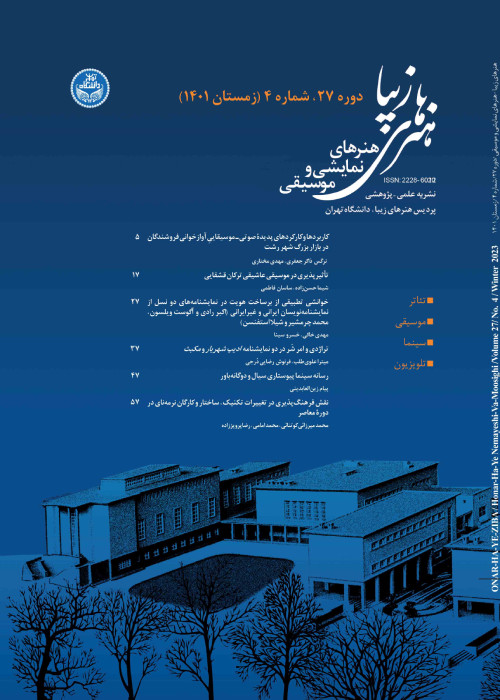Carnivalesque in Romeo and Juliet
Author(s):
Abstract:
Mikhail Bakhtin is arguably one of the greatest literary theorists in the twentieth century. He introduced theories in a variety of fields including psychology, philosophy, linguistics, and literary criticism. The extraordinary conditions under which he lived and worked attract the attention of not only literary scholars, but also political scientists, cultural historians and even biographers. It is believed some of the theories introduced by him had been inspired by the events in his eventful life. He has introduced numerous innovative theories among which the concept of carnival is one of the most intriguing. Caryl Emerson has rightly considered this concept to be "the weakest, least consistent, and most dangerous category in Bakhtin's arsenal." This concept is introduced in the book "Rabelais and His World". In this book he successfully locates Rabelai's book in the popular cultural forms that surrounded him. Thus the reader's attention is drawn to a gay, life-affirming and anti-authoritarian attitude to life in the Middle Ages. One of the most important notions through which Bakhtin makes the transition from popular-festive life to the writing of Rabelais is the notion of grotesque realism. At first glance grotesque seems to be a familiar word. However, his grotesque realism is a special notion. It is based on the material and the bodily. In this notion the body which eats, digests, copulates and defecates in an exaggerated and grotesque way is celebrated. The most interesting characteristic of this body is the fact that in this body "becoming" rather than "completion" is evident. Bakhtin himself refers to this celebration of the uncompleted as "gay relativity". In this notion great importance is attached to what he calls "lower body stratum" and some organs in the body are of particular importance. Other elements of carnival include crowning and uncrowning, subversion of authorities, the language of the market place and carnival laughter. Carnivalized writing includes writings in which the spirit of carnival is found. This study sets out to analyze the classic play "Romeo and Juliet" written by William Shakespear considering the elements of carnivalized writing. There has been a lot of controversy over years as to whether "Romeo and Juliet" should be considered to be a tragedy or not. While some critics have conveniently omitted all the happy scenes, others have considered them to be essential to the integration of the play. Particularly in this study these scenes are of great significance. This study reveals that this play can be considered to be carnivalized writing and the ambivalence of carnival imagery is evident in it. Moreover, the relativity of official certainties and also instances of crowning followed by uncrowning can be found in this play. Furthermore, the language of the market place can be observed in this play specifically in characters who belong to lower social classes. In all these a pattern is traced in the play in which analogues can be found for Shakespeare's writing in carnival and popular-cultural forms. This analysis can result in innovations in performing this play.
Keywords:
Bakhtin , Grotesque Realism , Carnival , Romeo , Juliet
Language:
Persian
Published:
Honar-Ha-Ye-Ziba: Honar-Ha-Ye Mosighi Va Namayeshi, Volume:16 Issue: 43, 2011
Page:
51
magiran.com/p1022289
دانلود و مطالعه متن این مقاله با یکی از روشهای زیر امکان پذیر است:
اشتراک شخصی
با عضویت و پرداخت آنلاین حق اشتراک یکساله به مبلغ 1,390,000ريال میتوانید 70 عنوان مطلب دانلود کنید!
اشتراک سازمانی
به کتابخانه دانشگاه یا محل کار خود پیشنهاد کنید تا اشتراک سازمانی این پایگاه را برای دسترسی نامحدود همه کاربران به متن مطالب تهیه نمایند!
توجه!
- حق عضویت دریافتی صرف حمایت از نشریات عضو و نگهداری، تکمیل و توسعه مگیران میشود.
- پرداخت حق اشتراک و دانلود مقالات اجازه بازنشر آن در سایر رسانههای چاپی و دیجیتال را به کاربر نمیدهد.
دسترسی سراسری کاربران دانشگاه پیام نور!
اعضای هیئت علمی و دانشجویان دانشگاه پیام نور در سراسر کشور، در صورت ثبت نام با ایمیل دانشگاهی، تا پایان فروردین ماه 1403 به مقالات سایت دسترسی خواهند داشت!
In order to view content subscription is required
Personal subscription
Subscribe magiran.com for 70 € euros via PayPal and download 70 articles during a year.
Organization subscription
Please contact us to subscribe your university or library for unlimited access!


